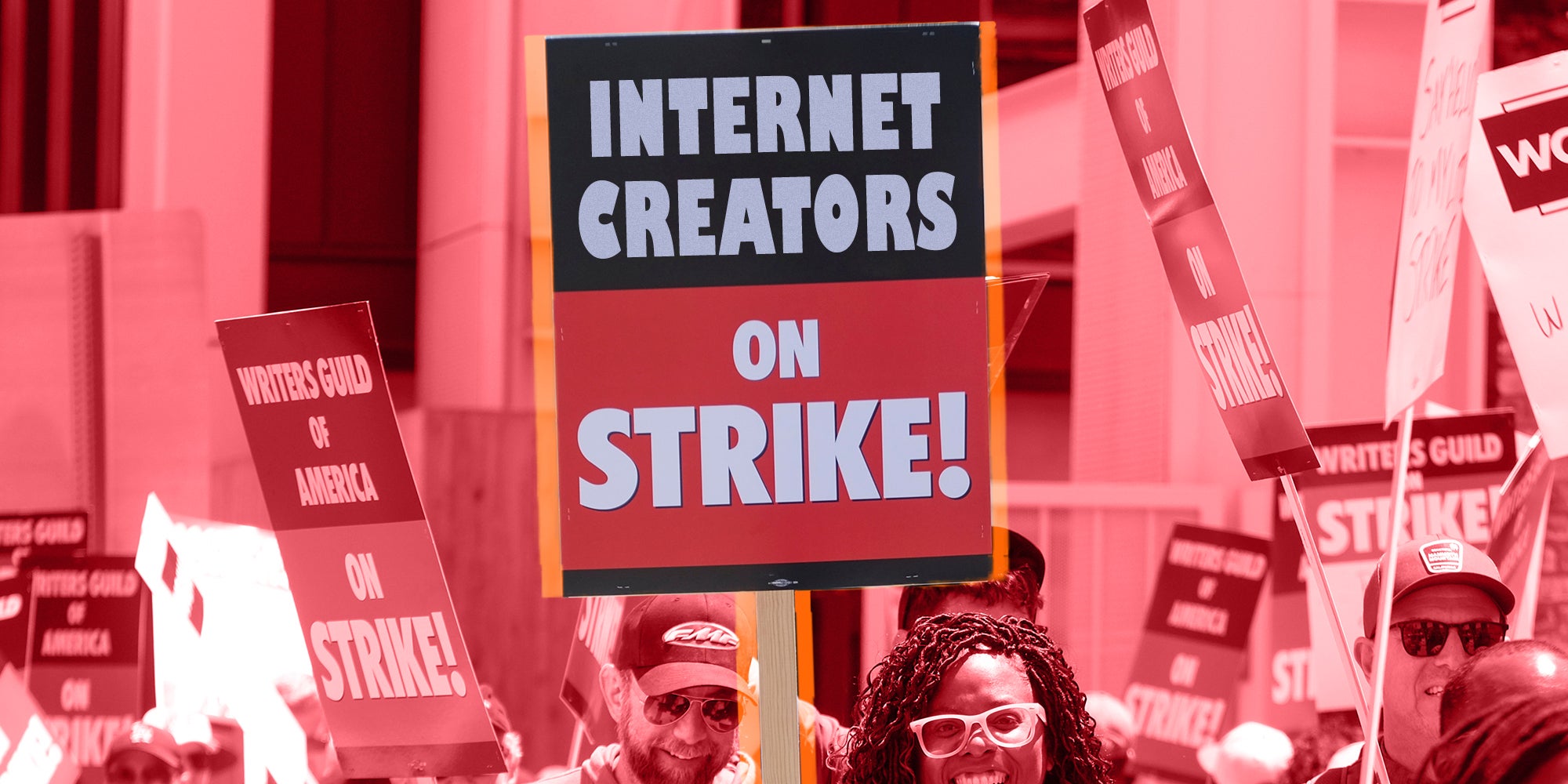
In a new weekly column, writer Lon Harris examines the Writers Strike and how the WGA’s organizing can work for the creative industry.
Analysis
Last week, we talked about how both the Writers Guild of America (WGA) strike and the online creator community found themselves toiling on behalf of massive multinational conglomerates that don’t always value their efforts. This week, we’re examining another way in which the fates of TV and film writers and their digital creative counterparts are tied: the vital importance of being part of a vibrant community, rather than an individual facing a cruel and complex system alone.
Obviously, individual writers lack the leverage to convince the industry to raise their wages. Powerful producers like Shonda Rhimes or Ryan Murphy can secure lucrative deals for themselves, but these don’t have a trickle-down impact on the rates being paid to their junior colleagues. Only via collective action like the writers’ strike do the writers have any hope of actually improving their overall pay structure, residual rates, and so on.
It still may not be enough. Writers are looking for support from other entertainment unions—the crew members union (IATSE), the directors union (DGA), and of course, the actors union (SAG-AFTRA)—to join their protests and refuse to cross picket lines. A large-scale effort to shut down Hollywood productions, not allowing networks and streamers to fill up their libraries with fresh content to please consumers, will be necessary if the writers are going to have a hope of forcing their employers’ hands and bringing them back to the negotiating table.
Up against giants
Creators also lack practical and immediate leverage when working through conflicts with larger platforms. In the case of ongoing disputes with major companies like Alphabet-owned YouTube or ByteDance’s TikTok, even some of the most popular creators can’t convince the companies to shift unpopular policies.
As previously covered by Passionfruit, Hank Green, one of the most well-known OG YouTubers out there and the founder of VidCon, made waves in early 2022 by criticizing TikTok’s creator fund, which divides a fixed and relatively small pool of money among an exponentially growing number of creators. The news made headlines, with many TikTokers issuing a rallying cry against the platform. Yet, TikTok’s stagnant creator fund structure still remains.
Amazon’s Twitch has also frequently angered its user base by considering or even implementing waves of unpopular rule changes, such as last year when it reduced its 70-30 revenue share deal with top creators to a 50-50 split and banned some forms of gambling content on the platform.
Still, lasting change has not come without more direct action from creators with real-world implications for the platforms.
The ultimate dream
Actual unionization remains a relatively far-off dream for online creators for a number of reasons. Culturally, they often work individually or in small groups, separated physically from their colleagues. Technically, most creators aren’t employees of their chosen platform, but more like “top users,” giving them a lot less practical leverage—along with more freedom to move around between homes.
Financially, many creators’ incomes are varied and unpredictable, highly dependent on the whims of top patrons, one-off sponsorships, and ever-shifting algorithms and platform policy changes. Not to mention, many are younger, or just starting out in their professional careers, and don’t have savings to fall back in the event of a boycott or strike or established pathways to side jobs that can get them through a lean period.
Nonetheless, creators have already proved that they do have some ability to push for change through collective action and organization. In 2020, many Twitch users participated in a day-long blackout in response to allegations of sexual harassment against community members. The following year, Twitch users promoted the hashtag #TwitchDoBetter as a way to push back against so-called “hate raids” on the platform.
Twitch responded to both of these movements with official statements and some new features, primarily chat filters designed to address specific forms of trolling—though many streamers have since argued the changes didn’t go far enough.
And still, as users rather than employees, creators have limited legal options beyond boycotts and public awareness campaigns. A 2019 class action lawsuit brought against YouTube by LGBTQ content creators alleged that the platform discriminated against them, labeling informative or inoffensive queer-themed content as “shocking” and “sexually explicit” while far more aggressive examples of hate speech continued to spread widely across the platform. In 2021, a federal judge dismissed the suit, ruling that as a private platform, YouTube had a right to set its own standards and guidelines.
Breaking barriers, building bridges
More promising are the opportunities presented by less formal online communities, through which creators can assist, advise, and emotionally support one another. Working with technology itself can be isolating, and being an online creator adds numerous challenges. The work involves a lot of writing, research, editing, and other solo activities.
While a creator can share some aspects of their work with their audience, sharing too much too openly ruins the “surprise” and the thrill of discovery once new posts and projects are ready for public view. As an old Reddit thread by an anonymous YouTuber describes, finding some success on the platform can be even more isolating, and it breeds jealousy among former community members and prompts the arrival of new “haters” and “trolls.”
Finding a like-minded community of other creators can be a vital link back to the social world and a reminder that life exists beyond YouTube, Twitch, TikTok, and Discord. Just as WGA writers have found themselves energized on the picket line by making new friends (or even having fun with some celebrity karaoke), creators can find new inspiration and insight from one another in online or even physical communities that can help them push forward and thrive in difficult circumstances.
We’ll be back next week, with another lesson digital creators can take from the Writers Strike: focusing on the big picture rather than just worrying about the next gig.




